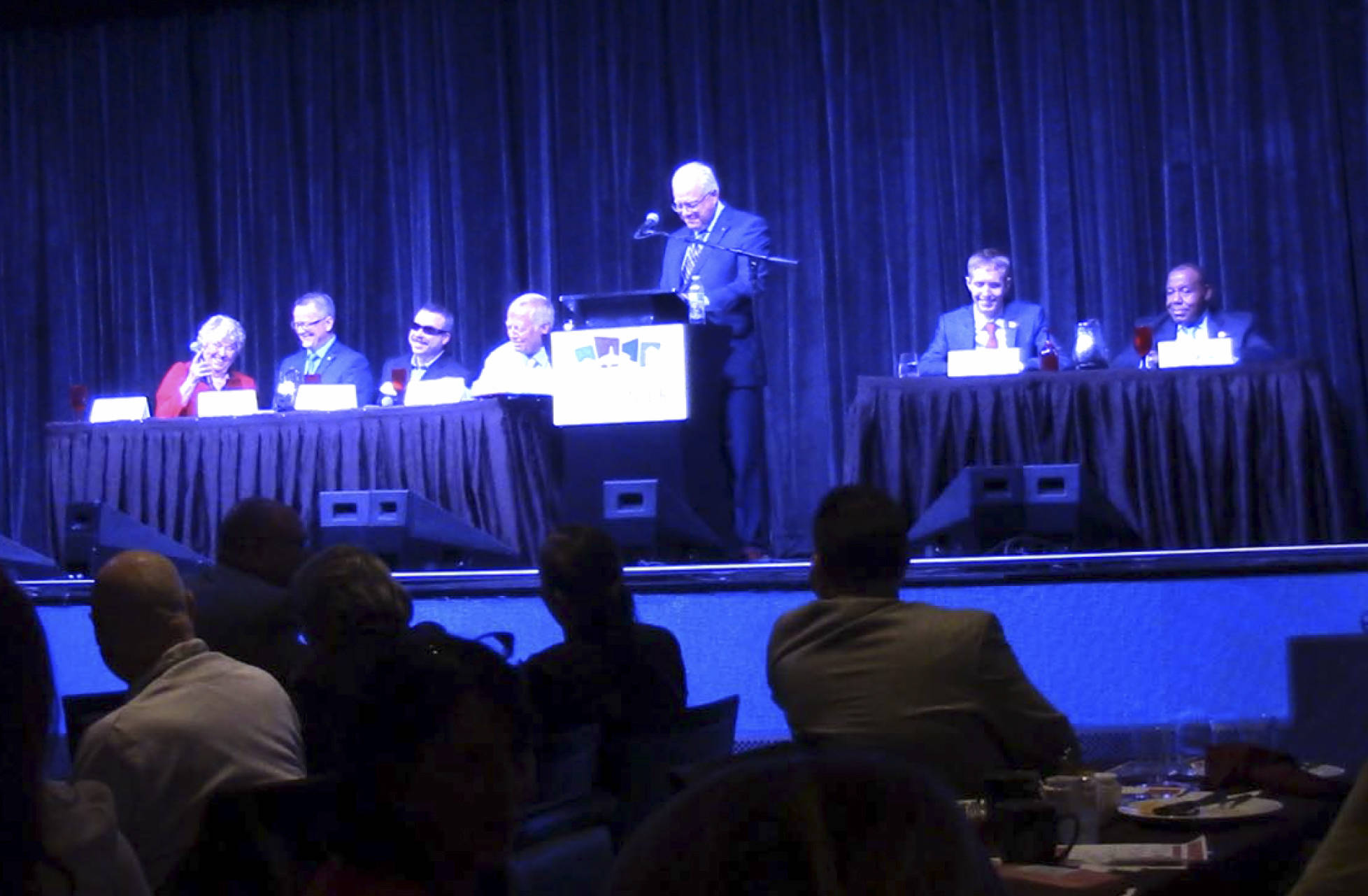TULALIP – The opioid epidemic, regional fire authority talks, and the ingenuity it will take to grow existing business and attract new investors to this rapidly growing area were among the issues debated at a candidates forum Friday.
Four candidates vying for Marysville City Council and two for Snohomish County Council District 1 appeared at a forum in the Tulalip Casino hosted by the Marysville Tulalip Chamber of Commerce.
Small-business owner and Army veteran Mark James is challenging six-term incumbent and Realtor Donna Wright for Position 2, while lifelong resident and Park Board member Tom King is looking to unseat 16-year incumbent and electrician Jeff Seibert for Position 3.
Democrat Ray Miller, a retired Air Force veteran and substance abuse counselor, is going up against Republican Nate Nehring, a middle school teacher who was appointed to the county council seat in January that serves voters in north county.
The candidates shared their positions on issues in advance of absentee ballots that will arrive in mailboxes around Oct. 19, leading up to the Nov. 6 general election.
City Council
When it came to the opioid epidemic, the candidates were united in their position that addiction and homelessness are taking their toll, and embedded social workers can play a central, street-level role with law enforcement to break the cycle of addiction for those ready to get clean.
As a longtime Snohomish Health District board member, Wright can attest to the magnitude of the crisis.
“Opioid abuse is one of our top subjects,” she said, visibly tearful as she spoke about the generations addiction impacts, from early school-age children living around heroin to senior citizens using over-prescribed painkillers or forgetful on how much they have taken.
She said the city should follow the county’s lead and propose a ban on safe injection sites. “I don’t want them in our city.”
James said city government can only be part of the solution.
He recommended bringing more professional services to the area, seeking out faith-based support, more community education and prevention efforts, and safely and intelligently caring for addicts. “We need to help these people find their dignity,” he said.
Seibert recommended working with the health district, which has developed an opioid website with volumes of information and features that track opioid activity day to day.
As a food bank volunteer, King said he sees firsthand the results of addiction and homelessness. “As a society, we need to help fund those in need of counseling and rehabilitation,” he said.
King advocates for grounded programs that keep people engaged, such as parks, recreational and cultural programs, the YMCA, service clubs and after-school programs.
Among top city issues – other than the ever-present traffic congestion and efforts to improve roads – a new public safety center and proposed RFA grabbed most of the attention, along with growing the jobs base.
James said police need an updated public safety building with a jail and integrated court to keep pace with population growth.
Wright agreed, adding that the question will be how to pay for a new facility without taxing citizens.
Seibert said if the new public safety center is relocated somewhere in the business and waterfront district, that would also help to bring more people downtown.
King favors the RFA under discussion between Marysville, Arlington and Fire District 12 to consolidate manpower, resources and equipment into a more cost-effective service.
There are still many issues to resolve in RFA talks, but in terms of governance, Seibert said, “I will not support anything that does not favor Marysville city representation on the board. We are providing the biggest assets to the RFA, so our city should have the most say in that.”
Wright called the city business-friendly. “If you talk to people who have tried to establish businesses in other cities, they choose Marysville for quality of life and response by our city staff, Community Development department, the permitting process and how they go out of their way to help.”
Actually, James offered, Marysville is perceived as “business unfriendly” city. One local businessman told him the system is unnecessarily difficult and time-consuming to set up a business.
He’s considering expanding in a neighboring city because of these issues.
County Council
Nehring said he has been working on the opioid issue. The county council last week passed his legislation toward a permanent ban of safe injection sites countywide, and Executive Dave Somers’ $240 million operating budget includes Nehring’s request for an embedded social worker. Nehring said his efforts to tackle opioid abuse are focused on prevention, treatment for addicts ready to turn their lives around, and supporting law enforcement in dealing with the resistent segment that commits property crimes to feed their habit.
Miller, a clinical therapist and a strong advocate of treatment, shared the success story of a young Air Force veteran he met who was homeless and sleeping in a doorway at an abandoned store. With access to help, he and his wife are college graduates now with two children.
“Most important is to explain to the community what the signs and symptoms of drug and alcohol addiction are,” Miller said. “Addiction is just the symptom; the real problem is pain and suffering.” He supports more programs that get to the root cause of addicts’ problems, earlier treatment and more treatment centers.
Jobs creation and the county budget were among both candidates’ key issues.
Miller said 190,000 people leave each morning to go to work outside the county. Leaders need to envision ways to generate economic development closer to home that helps reduce travel time and traffic congestion, with incentive programs that help attract business.



